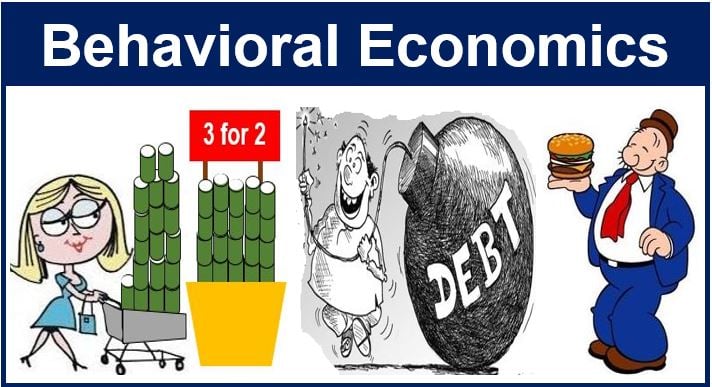Behavioral economics looks at how psychology affects economic decision-making. In other words, it looks at how our thoughts and emotions may affect how we make decisions about money. Behavioral economics explores why we sometimes make irrational decisions.
Additionally, it explores why and how what we do may not follow forecasts that economists make using economic models.
Behavioral economists try to develop models which explain why we are impatient and procrastinate. Their models also account for why we do not always make the best choice when decisions are hard. In fact, sometimes we even completely avoid making a decision.
Unlike traditional economics, behavioral economics takes into account that humans seldom make decisions rationally.
For example, prospect theory shows how we place more weight on an unpleasant event than its equivalent pleasant event.
Rational expectations theory shows that humans analyze all available data before making predictions. Surprisingly, those predictions are extremely accurate.

What makes people go for special offers? Why do consumers get so much in debt? Why do so many of us eat junk food when all data tells us it’s bad for the health?
Many factors influence how we spend our money. For example, what other people are doing or have done, past behavior, offers, and promotions influence us. Additionally, what is available, social norms, beliefs, and brand perceptions push us to spend in certain ways.
Behavioral economics – a new field
Behavioral economics is a relatively new field. It has emerged as an important area of modern economics, as well as the social sciences more generally.
Companies have long known the limitations of individual decision-making. Businesses regularly use this knowledge in their commercial practices.
Behavioral economics became popular after Professor Daniel Kahneman the 2002 Nobel Memorial Prize in Economic Sciences. Prof. Kahneman, an Israeli-American psychologist, shared the prize with Vernon L. Smith. His empirical findings directly challenged the assumption of human rationality that prevailed in modern economic theory.
Prof. Kahneman’s award subsequently led to a huge explosion of interest in behavioral economics.
Marketers and behavioral economics
According to Ned Welch, marketers had been using behavioral economics before there was a name for it. Mr. Welch is a senior practice expert at the American multinational management consulting firm McKinsey & Company.
‘Three for the price of two’ offers grew because they worked. So did ‘buy now pay later’ plans. They did not grow as a result of studies.
In other words, those offers hadn’t grown because economists had told them to use them. No study had shown that people prefer a supposedly free incentive to an equivalent price discount.
However, even though companies had been using elements of behavioral economics, few did so systematically.
According to traditional economic principle, we all experience the same level of pain when we spend. Put simply; my pain when I spend a dollar is the same as yours.
In reality, however, several factors influence how we value a dollar. Additionally, those factors influence how much pain we feel when we spend it.
Businesses know that allowing shoppers to delay payment encourages them to buy. Economic models tell us that delayed payment works because future payments make the whole process less costly.
However, there is also a less rational reason why people like to pay later. We simply don’t like paying because it hurts. Not only do we enjoy buying now when we pay later, but we also avoid the pain. We avoid the pain of paying.
Marketing executives have known for a long time that consumers are driven by irrational thinking. Behavioral economics helps us predict that irrationality.
Knowing how tiny features in an offer change consumers’ behavior is extremely useful.
